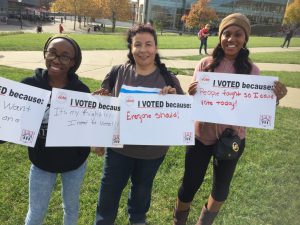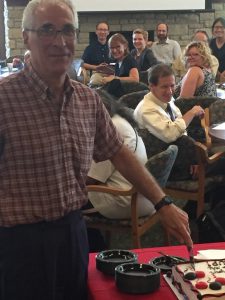 President’s Corner
President’s Corner
We enter November with much to be thankful for. The semester is winding down. Holidays are right around the corner. Best of all, we will soon be free from the constant onslaught of political ads! Here’s what’s new with the Chapter.
The 2016-2019 Collective Bargaining Agreement is fully in place. An electronic copy is available on the AAUP-UC Chapter’s website @ http://aaupuc.org/resources/contract/. As soon as the indexing is finished, we will send things over to the printers. We anticipate mailing out copies of the contract within the coming month. In order to keep costs down, and to be as green as possible, Bargaining Unit members will receive an email next week giving them the option of requesting a print copy of the full Collective Bargaining Agreement. All Bargaining Unit members will receive a print copy of the Quick Reference Guide to the Contract.
The Chapter continues to build on its strong work over the past 2 years of analyzing UC’s budget and spending priorities, as well as the continued austerity unnecessarily forced on academic programs by the performance based budgeting model in combination with State of Ohio higher education funding. For anyone interested in a thorough discussion of austerity in higher education, there is a new book on the topic titled Austerity Blues by two CUNY Professors, Michael Fabricant and Stephen Brier (https://www.insidehighered.com/news/2016/11/02/qa-authors-book-austerity-public-higher-education). This continued work, as well as other important matters that impact faculty and shared governance, should be undertaken with a renewed sense of collaboration between the AAUP-UC Chapter and the UC Faculty Senate.
From the faculty’s right to collective bargaining to the university budget to higher education funding—these are all things that are inextricably linked with the political and legal decisions made locally, in Columbus, and in Washington, DC. The Chapter organized a very successful Get Out the Vote event on November 1st. Well over 400 were in attendance. Check out the article about it in this issue of Works. Obviously, this election is fundamental to our democracy and will shape our future for years to come. If you haven’t voted yet, I implore you to exercise your right as a citizen of this great country and vote on November 8th.
Ron Jones, President
 PAC Update
PAC Update
On November 1st the Political Action Committee (PAC) sponsored a Get Out the Vote (GOTV) picnic on McMicken Commons on the Uptown Campus. It was incredibly well-attended with over 400 faculty, students, and UC employees attending. The event was billed as lasting until the food ran out, which it did around 1:15 PM.
Thanks to the following student groups that partnered with the AAUP: GSGA, USG Government Affairs Committee, The Irate 8, Psi Chi International Honor Society for Psychology, The Association of Black Social Workers, and others. Thanks as well to the AAUP members that assisted with this great event.
Faculty from UCBA will be conducting a companion event on that campus on Monday, November 7th, which should also be a great success.
The GOTV picnic was just part of a larger campaign encouraging faculty to talk to students about voting and the election. Students and young people are the most inconsistent block of voters. This leads to elected officials ignoring issues that are important to students and faculty, including higher education funding and student loan debt.
The PAC encourages faculty to talk to students about voting. Following are a few activities to consider:
Sample lesson plans, appropriate for some disciplines, can be found at the AAUP-UC website.
Early voting is underway in Ohio. There is no better way to stimulate conversation than saying, “I voted today. Have you voted?”
Some departments are organizing early vote days and car pools to the BOE. Consider this for your department.
You can also vote by mail. Ballots must be postmarked by November 7th.
The election is Tuesday, November 8th.
Phoebe Reeves, PAC Chair
 IMPORTANT CHANGES TO ARTICLE 7 UNDER THE 2016-2019 COLLECTIVE BARGAINING AGREEMENT
IMPORTANT CHANGES TO ARTICLE 7 UNDER THE 2016-2019 COLLECTIVE BARGAINING AGREEMENT
The new 2016-2019 Collective Bargaining Agreement effects several important changes to Article 7. These changes most notably impact the RPT criteria revision process and RPT committee procedures, but also affect other aspects of the RPT process for candidates and reviewers alike. Here’s a brief review:
The RPT Criteria Revision Process
As in the past, the 2016-2019 CBA requires Academic Units to review their RPT Criteria once every five years. Academic Units are not required to alter their RPT Criteria, but only to review them to see if any revisions are necessary. This revision process was described in vague terms under previous contracts, and could conceivably (and often did) last indefinitely. With the 2016-2019 CBA, the AAUP and the Administration have attempted to clarify and structure this process, so that it can proceed more expeditiously. We have done this by adding deadlines and by making clear the roles of the respective parties at various points in the process. These steps are outlined in Article 7.3.3.1 through Article 7.3.3.4, and are summarized below.
The Academic Unit must notify the Dean and the AAUP when it has initiated its RPT Criteria review.
- Each Academic Unit has 90 days to complete its review.
- If the Academic Unit has decided to propose changes to its RPT Criteria and/or procedures, it must provide those proposed changes to the Dean and the AAUP.
- The AAUP will review the proposed changes only to make sure that they comply with the CBA. The AAUP has 7 days to complete this review and to notify the Academic Unit, Dean, and Provost of its conclusions.
- The Dean has 30 days from the AAUP’s notice to review and respond to the Academic Unit’s proposed changes.
- The Academic Unit has 21 days to review the Dean’s response and to propose additional changes, if applicable. If the Academic Unit has additional changes, it shall forward these to the Dean and the AAUP. The AAUP will again have 7 days to review these changes and to notify the Academic Unit, Dean and Provost of its conclusions.
- The Dean shall have 30 days from the AAUP’s notice to review and either approve the proposed revised RPT Criteria or to respond to the Academic Unit with suggested revisions. If the latter, the timelines under the previous bullet point will apply.
- When the proposed revisions are receive final approval from the Dean, a copy of the revised RPT Criteria shall be provided to the Dean, the Provost, the AAUP, and to all of the Faculty Members in the Academic Unit.
RPT Committees: Eligibility to Serve
The 2016-2019 CBA has two significant changes with respect to the constitution of RPT committees at both the departmental and college levels. These can be found in Article 7.5.6.
- First, if a Faculty Member is seeking reappointment, promotion, and/or tenure during a review cycle (an academic year), then he/she may not serve on an RPT committee at either the departmental or college levels. The purpose of this change is to give that Faculty Member some “distance” from the process. Here, the intent is to preserve objectivity in the review of dossiers during that year (since the way in which a Faculty Member views his/her own dossier and prospects may impact, even more directly than usually, his/her perspective on others’ pending dossiers).
- Second, a Faculty Member may not serve on more than one level of review during a review cycle. In other words, a Faculty Member may not serve on both his/her Academic Unit RPT Committee and his/her college RPT Committee. We have found even when a Faculty Member on a college RPT Committee recuses him/herself from considering dossiers from his/her Academic Unit (on which he/she has already voted), concerns that the Faculty Member may nonetheless influence the College RPT Committee’s review, however unfounded, nonetheless create a powerful perception and erode the candidates’ trust in the process.
If an Academic Unit Head is seeking review for reappointment, promotion, and tenure, he/she must seek a waiver from the Provost Office and the AAUP in order to review dossiers during an academic cycle.
RPT Committees: Procedure
Article 7.6.3 of the 2016-2019 CBA has two important procedural changes for all RPT committees, whether at the Academic Unit or college level:
- Voting must be effected through a secret ballot. Voice votes, shows of hands, etc., are no longer permitted.
- Committee deliberations must be remain confidential among committee members. In other words, aside from what is said in the recommendation letters, what is said in the meeting room stays in the meeting room.
In addition, the 2016-2019 now requires that each committee letter include a tally of the votes (e.g, 7-5, 3-2, 9-0, etc.). This is strictly a numerical tally: committee members should not indicate how they voted.
 NEW IN THE 2016-2019 CBA: EXTENDED TENURE PROBATIONARY PERIODS FOR FACULTY MEMBERS AT THE COLLEGE OF MEDICINE
NEW IN THE 2016-2019 CBA: EXTENDED TENURE PROBATIONARY PERIODS FOR FACULTY MEMBERS AT THE COLLEGE OF MEDICINE
The tenure probationary period for faculty within the College of Medicine had been under discussion among COM faculty, Administration and the AAUP since the negotiations over the 2010-2013 CBA. These discussions prompted the creation of a joint AAUP –Administration study group as well as more informal discussions in recent years. The increasingly difficult environment for securing grants for basic research in medicine, which shows little prospect for improvement in the foreseeable future, has made it more difficult for tenure-track COM faculty to achieve tenure. Early this year, the Chapter surveyed the Bargaining Unit faculty in the COM regarding the probationary period and options for adjusting it; the survey results showed significant support for allowing for two year extensions.
Under Article 7.5.11 of the 2016-2019 CBA, tenure-track Faculty Members at the College of Medicine – both current and new hires – will have two options when they are in the sixth year of their probationary period:
- request tenure; or
- request a two-year extension of their probationary period.
If the Faculty Member chooses to go up for tenure, the RPT reviewers considering his/her dossier have three options:
- recommend in favor of tenure;
- recommend against tenure but in favor of a two year extension; or
- recommend against both tenure and a two-year extension.
If the Faculty Member receives an extension under this new system, it can only be for two years – no more, no less. This is to prevent the Faculty Member from either having to submit another dossier in short order (if he/she had only received a one-year reappointment) or spending an unduly long time on the tenure track (if the extension was for three years or more).
Tenure-track Faculty Members at the College of Medicine can still go up for tenure before their sixth year; however, the option of a two-year extension is only available in their sixth year. So, for example, if a tenure-track Faculty Member requests tenure and promotion in his/her fifth year and is unsuccessful, in that Faculty Member’s sixth year, he/she could again request tenure or instead request a two-year extension of his/her probationary period.
 AAUP-UC Chapter Presents Maita Faye Levine Outstanding Service Award to Daniel Langmeyer for Decades of Service to the AAUP-UC Chapter
AAUP-UC Chapter Presents Maita Faye Levine Outstanding Service Award to Daniel Langmeyer for Decades of Service to the AAUP-UC Chapter
On September 8th, the AAUP-UC Chapter presented Prof. Daniel Langmeyer (A&S/Psychology) with the Maita Faye Levine Award for Outstanding Service.
Maita Levine was professor emerita of mathematics at UC and a leader in the UC Chapter AAUP. A scholar and a teacher, Levine fought passionately for equity for faculty members. She helped negotiate contracts for the UC Chapter and, in 2001, worked on the settlement that averted a strike set for the first day of the winter quarter. Levine embodied both service and leadership in the AAUP. Levine died on August 17, 2008 and left a gift to the UC Chapter.
The UC Chapter of the AAUP was organized during WWII. Then and now, the AAUP is the only professional organization whose primary purpose is to enhance the academy by preserving shared governance, academic freedom and collective bargaining in higher education. The UC Chapter, through the monetary gift from Levine, continued this tradition by establishing the Maita Faye Levine Award for Outstanding Service.
The award, which includes a monetary gift, is sponsored by the UC Chapter AAUP and is given to a Chapter member who, like Levine, has made significant and sustained service contributions.
Daniel Langmeyer held nearly every leadership position in the UC Chapter and made continuing contributions via service on the Bargaining Council, as a representative of A&S, and on negotiating teams. Former AAUP-UC Executive Director David Rubin said that “Daniel was a strong advocate for the financial well-being of the Faculty as well as the key figure in convincing Administration to be reasonable, especially regarding health insurance.” Rubin said that Daniel “was especially instrumental in preserving good health insurance at reasonable cost to Faculty.” Rubin also said that Maita Levine was a good friend, and the reason that he came to UC. “I know that she would also be very pleased to have Daniel honored by the award named for her.”
